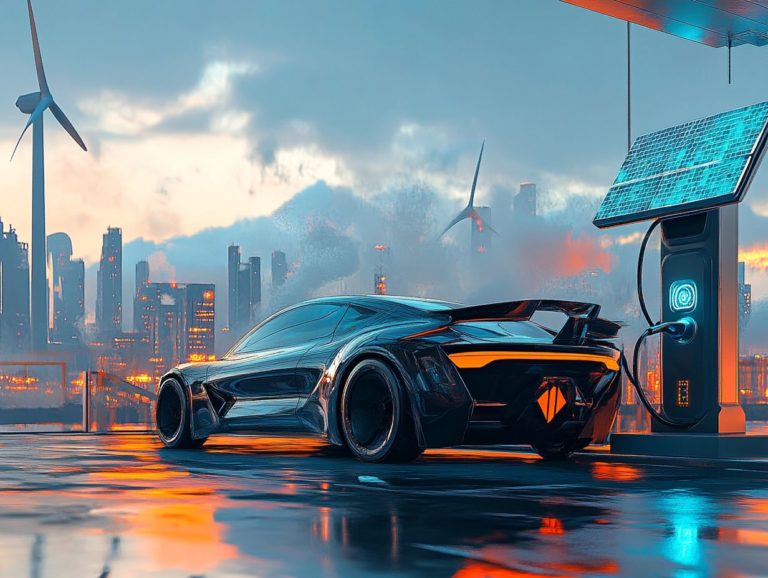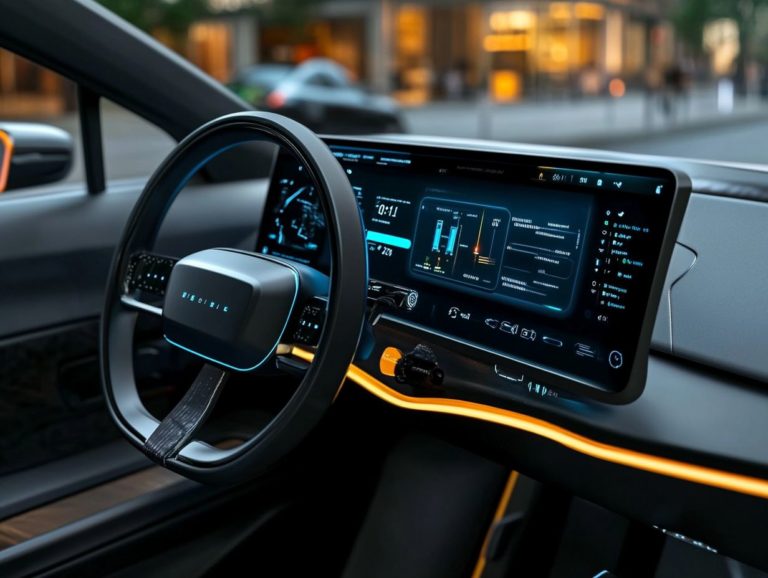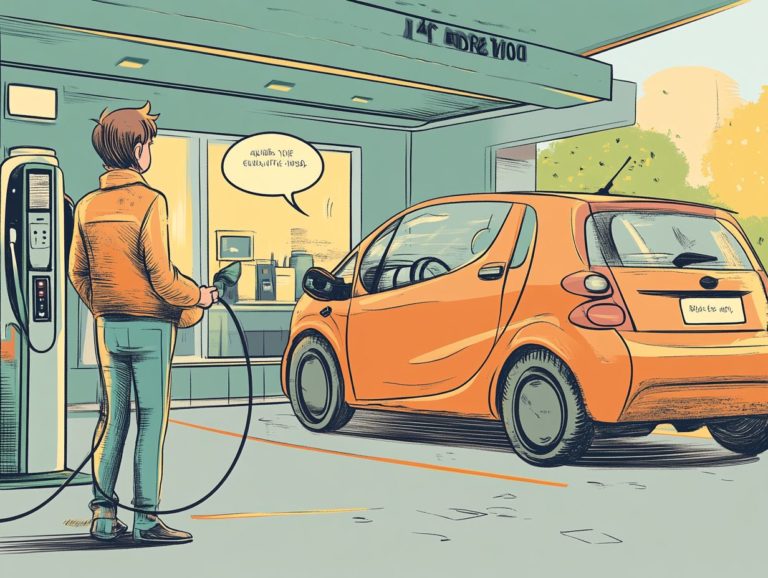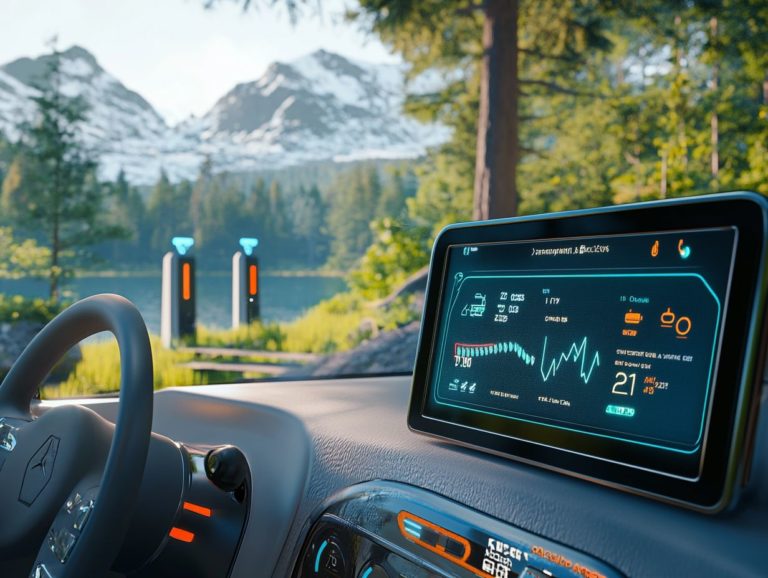what are the top electric vehicle brands?
Electric vehicles are reshaping the automotive landscape, presenting a cleaner and more sustainable alternative to traditional gas-powered cars.
In this article, you ll uncover the myriad benefits of electric vehicles, exploring their environmental and economic advantages that make them an appealing choice.
You ll discover the top brands leading this innovative market and key factors to consider when making your selection.
We ll highlight popular models and delve into the exciting future of electric vehicles, filled with growth and technological advancements.
Embark on this journey as you navigate the electrifying world of electric vehicles!
Contents
- Key Takeaways:
- Benefits of Electric Vehicles
- Top Electric Vehicle Brands
- Factors to Consider when Choosing an Electric Vehicle
- Popular Electric Vehicle Models
- Future of Electric Vehicles
- Frequently Asked Questions
- What are the top electric vehicle brands?
- Which electric vehicle brand has the most models available?
- What type of electric vehicles do these top brands offer?
- Are these top electric vehicle brands affordable?
- Do these brands have a good driving range?
- What makes these top electric vehicle brands stand out?
Key Takeaways:
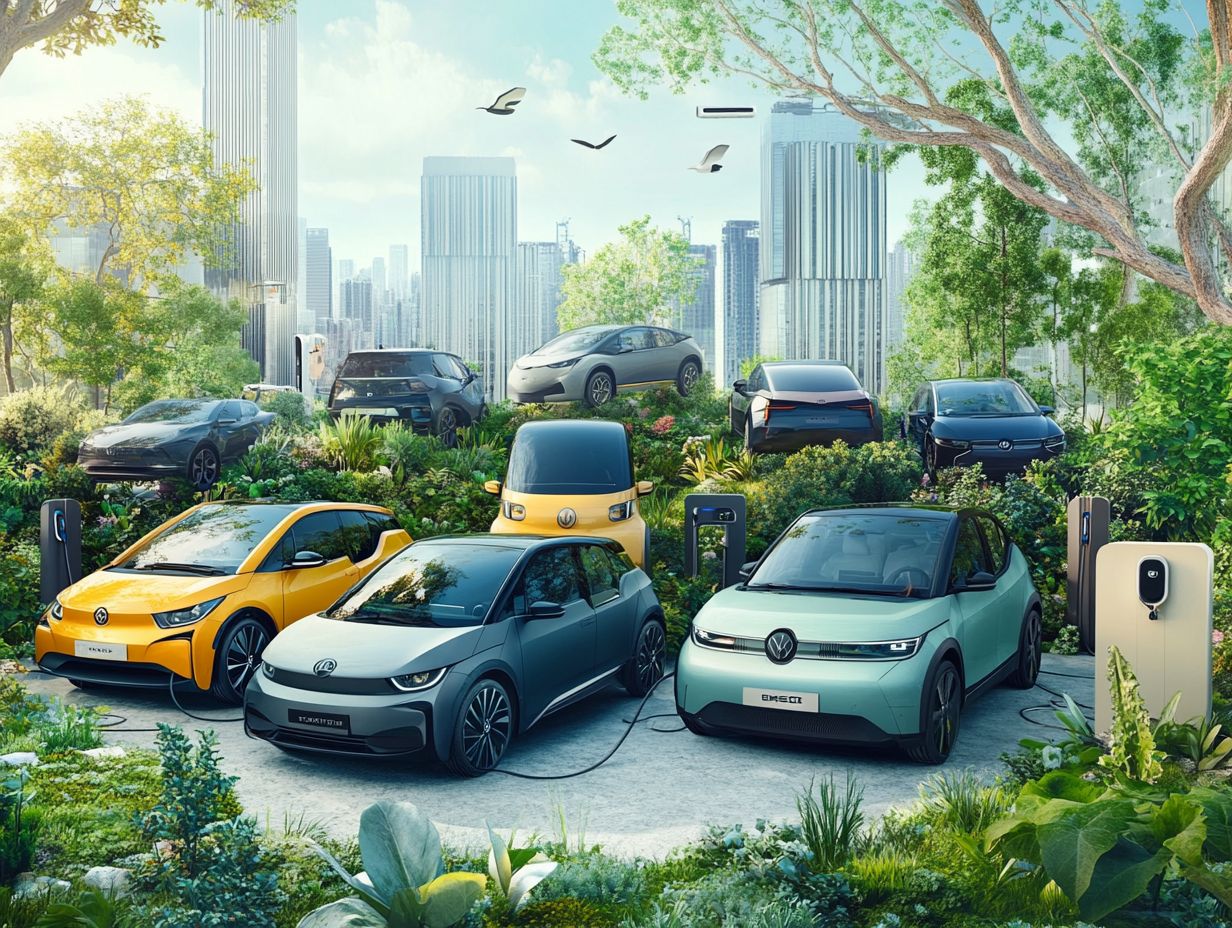
- Electric vehicles offer environmental and economic benefits, making them a sustainable choice for transportation.
- Top electric vehicle brands include Tesla, Nissan, and Chevrolet, known for impressive range and performance.
- Important factors to consider when choosing an electric vehicle are range, charging time, and price, which vary among models and brands.
What are Electric Vehicles?
Electric vehicles signify a remarkable evolution in the automotive landscape by using electric energy instead of conventional fossil fuels.
Consider models like the Fiat 500 and Abarth 500e; they focus not only on performance but also on reducing carbon emissions to address pressing environmental issues.
The electric vehicle market is gaining momentum, offering a variety of options, including the Hyundai Kona Electric, Renault Scenic, and luxury choices like the BMW i4, Tesla Model 3, and Porsche Taycan each catering to your unique preferences and lifestyle.
Electric vehicles come in different types, such as:
- Battery electric vehicles (BEVs): Run solely on electricity.
- Plug-in hybrid electric vehicles (PHEVs): Combine electric and gasoline engines.
- Fuel cell electric vehicles (FCEVs): Use hydrogen to power the electric motor.
This classification reflects advancements in battery technology and charging facilities, making electric vehicles increasingly viable for everyday use.
Take the Tesla Model Y; it has an impressive range and fast charging capabilities, making it a leader in the segment. Meanwhile, the Lotus Eletre highlights luxury and performance, showcasing the industry’s exciting shift toward high-tech features and eco-friendly materials.
These innovative models not only enable zero-emission driving but also incorporate cutting-edge technology, ushering in a transformative shift towards sustainable mobility.
Benefits of Electric Vehicles
Electric vehicles present numerous advantages that extend beyond convenience, playing a crucial role in promoting environmental sustainability and enhancing economic efficiency.
With a reduced carbon footprint, models like the Kia EV9 and Jeep Avenger help cut harmful emissions, essential in the fight against climate change.
Electric cars save you money on fuel costs, with options like the Dacia Spring and Volvo EX30 offering significant energy efficiency. This makes them a smart choice for today’s mindful consumers.
Environmental and Economic Advantages
The environmental and economic benefits of electric vehicles are substantial, establishing them as crucial players in today s sustainable transportation landscape.
By choosing models like the Hyundai Kona Electric or Renault Scenic, you can significantly reduce your carbon footprint while enjoying enhanced energy efficiency.
This transition helps mitigate climate change and leads to noteworthy economic savings over time through lower fuel and maintenance costs.
The move to electric vehicles also improves air quality. With zero tailpipe emissions, urban areas can see significant enhancements in air quality, resulting in better health outcomes for you and your community.
When comparing electric options such as the BMW i4 and Tesla Model 3 to traditional gasoline vehicles, potential savings on fuel costs become clear.
Although the upfront investment for electric models may be higher, the long-term savings in maintenance and operating costs make them an increasingly attractive choice for discerning consumers.
As adoption rates rise, economies of scale could further enhance these advantages, solidifying electric vehicles’ role in a more sustainable and economically viable future.
Top Electric Vehicle Brands
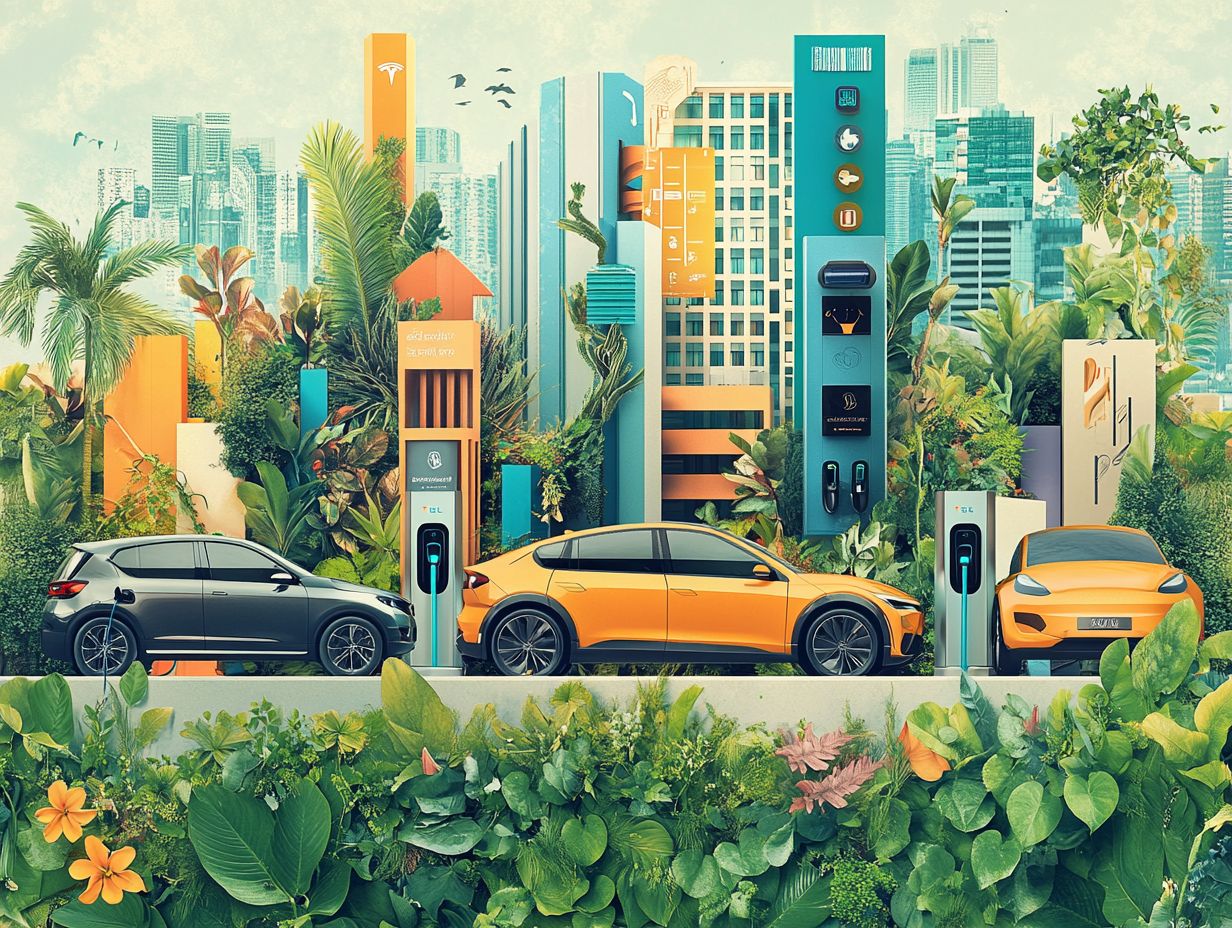
The electric vehicle market is vibrant, shaped by several leading brands, each presenting distinctive features and innovations for a diverse array of consumers.
Brands such as Tesla and BMW have made remarkable advancements in electric mobility. Standout models like the Tesla Model 3 and BMW i7 set industry benchmarks.
Manufacturers like Hyundai and Renault offer dependable choices, including the Hyundai Kona Electric and the Renault Scenic.
Luxury brands like Porsche and Maserati elevate the experience with high-performance electric offerings, showcasing models like the Porsche Taycan and Maserati GranTurismo.
Overview of the Leading Brands
An overview of leading electric vehicle brands reveals a competitive landscape where innovation and consumer preferences play an important part in shaping their offerings.
In this dynamic environment, there s a range of strengths and market shares, with each brand carving out a niche that caters to your distinct needs.
Take Tesla, for instance. Its commanding presence excels in battery efficiency and boasts an extensive Supercharger network, making long-distance road trips easy for electric vehicle owners.
BMW caters to those who crave luxury and performance, positioning models like the i4 and i7 as sophisticated choices that don t compromise on sustainability.
If you’re looking for budget-friendly options, Hyundai’s Kona Electric and Renault’s Scenic demonstrate that practicality and affordability can thrive in the electric vehicle market.
Each brand’s unique technology such as Tesla’s Autopilot system or Hyundai’s regenerative braking, which helps recharge the battery when slowing down further showcases diverse approaches within this rapidly evolving market.
Factors to Consider when Choosing an Electric Vehicle
When selecting an electric vehicle, carefully consider several critical factors to ensure your choice aligns with your needs and preferences.
Key aspects to evaluate include the vehicle’s range, which can differ significantly between models like the Tesla Model 3 and BMW i4. You’ll also want to factor in charging time and overall price.
Understanding the available features, such as energy efficiency and technology integration, is vital for making an informed decision in today s rapidly evolving electric vehicle market.
Range, Charging Time, and Price
Range, charging time, and price significantly influence your decision when purchasing an electric car, impacting usability and satisfaction.
The Tesla Model 3, for example, boasts impressive range capabilities. Meanwhile, the BMW i4 and Hyundai Kona Electric offer competitive charging times, essential for daily commuting.
By understanding the price spectrum of electric vehicles, from budget-friendly options like the Dacia Spring to luxury models such as the Maserati GranTurismo, you can make informed choices that suit your lifestyle.
Consider the various technologies that directly affect these elements, like battery capacity and charging infrastructure. Tesla’s Supercharger network allows the Model 3 to achieve around 250 miles of range in just 15 minutes at a fast charger, setting a high standard in the industry.
The Hyundai Ioniq Electric, with its slightly lower range, focuses on efficiency and cost-effectiveness. Renault s Zoe exemplifies how brands navigate the electric vehicle market to meet diverse consumer needs while balancing technological innovations with affordability.
Popular Electric Vehicle Models
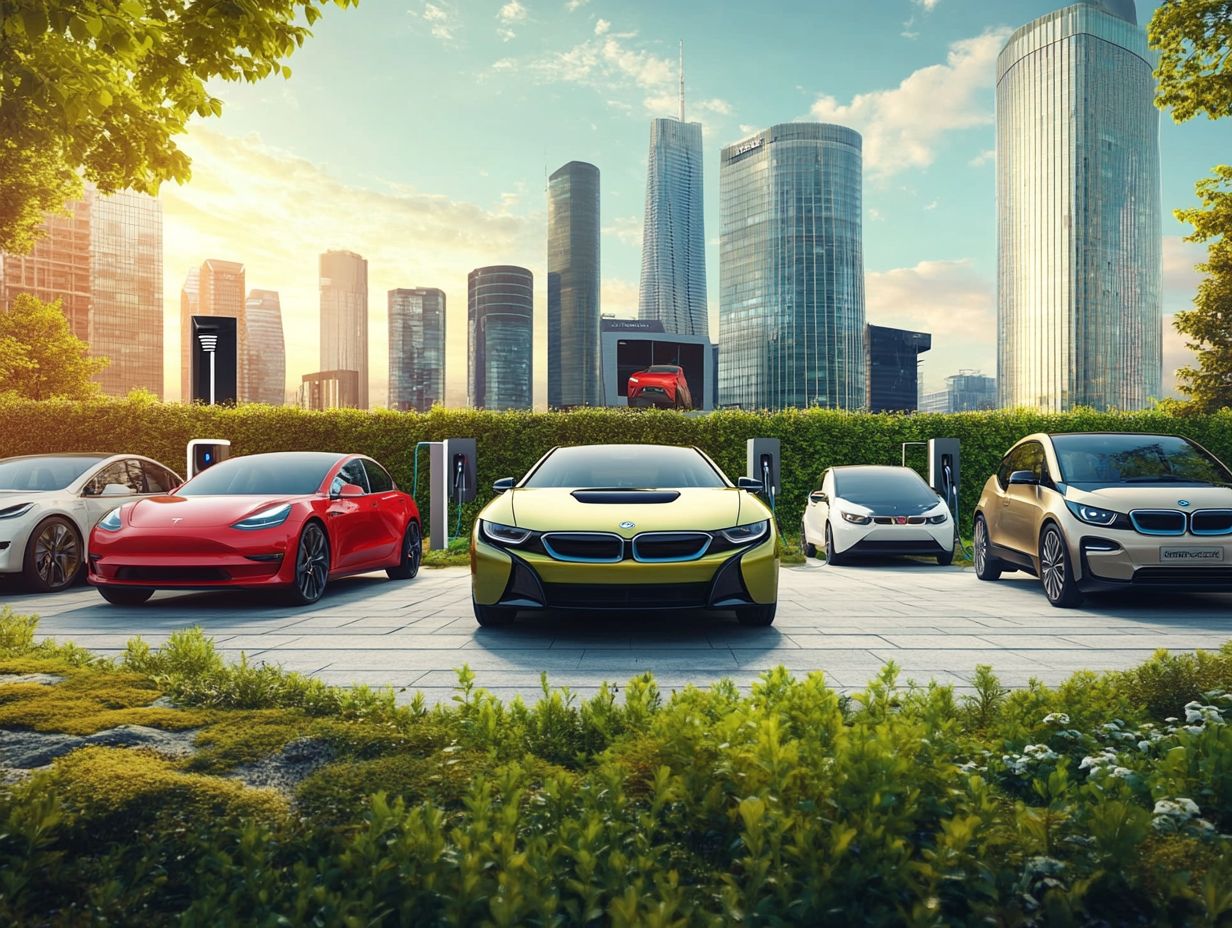
The popularity of electric vehicle models is surging, with several key contenders reshaping consumer preferences.
Models like the Tesla Model 3 and BMW i4 often take center stage, renowned for impressive performance and luxurious features.
More accessible options such as the Hyundai Kona Electric and Renault Scenic attract a diverse demographic eager for eco-friendly transportation.
Moreover, the Fiat 500 and Abarth 500e embody the charm of compact electric cars, making them particularly appealing to urban dwellers.
Explore electric vehicles that fit your needs today!
Features and Specifications
Analyzing the features and specifications of electric vehicles reveals what distinguishes each model in today s competitive marketplace.
Take Tesla, for example. The cutting-edge technology in models like the Model Y is hard to miss. In contrast, BMW s i4 blends luxury and performance seamlessly, making it a standout choice.
Hyundai and Renault also offer compelling options. The Kona Electric and Scenic are celebrated for their practicality and user-friendly interfaces.
When you explore the current lineup, battery capacity and range make a significant difference. The Model Y impresses with a remarkable range of up to 330 miles on a single charge, powered by a robust 75 kWh battery.
The BMW i4 strikes a harmonious balance between power and efficiency, zipping from 0-60 mph in just 3.9 seconds, thanks to two motors working together.
The Kona Electric deserves a nod for its affordable price and strong safety ratings, making it a family-friendly choice without skimping on essential features.
Each model integrates sophisticated safety technologies, such as systems that help prevent accidents by stopping the car automatically if needed and lane-keeping assist. These features significantly enhance the overall user experience and instill confidence on the road.
Future of Electric Vehicles
The future of electric vehicles looks bright, filled with exciting advancements. Swift innovations and transformations await the electric vehicle market.
As technology progresses, improvements in battery efficiency and charging infrastructure will be vital for influencing consumer adoption rates. Leading brands like Tesla, BMW, and Hyundai are at the forefront of these advancements, unveiling state-of-the-art features that elevate energy efficiency and enhance the overall driving experience.
This momentum could very well pave the way for wider acceptance of electric cars globally.
Expected Growth and Innovations in the Industry
The anticipated growth and innovations within the electric vehicle industry are set to redefine mobility and transportation solutions worldwide. Projections indicate a substantial increase in electric car sales, prompting brands to invest heavily in research and development to maintain their competitive edge.
Innovations in battery technology, from companies like BYD and General Motors, aim to enhance both range and efficiency. Emerging players like GEELY are also making noteworthy strides in this dynamic market.
There’s a rising emphasis on integrating smart technology into vehicles, elevating the driving experience. Advanced driver-assistance systems and connectivity features are transforming how we drive.
Collaborations between established automakers and innovative startups are charting new courses in production and sustainability. This synergy fuels market expansion and offers a diverse array of electric vehicle models tailored to meet your unique needs.
As the landscape of electric mobility evolves, expect an influx of models designed for everything from urban commuting to long-distance travel, making the transition to greener alternatives more accessible than ever.
Frequently Asked Questions
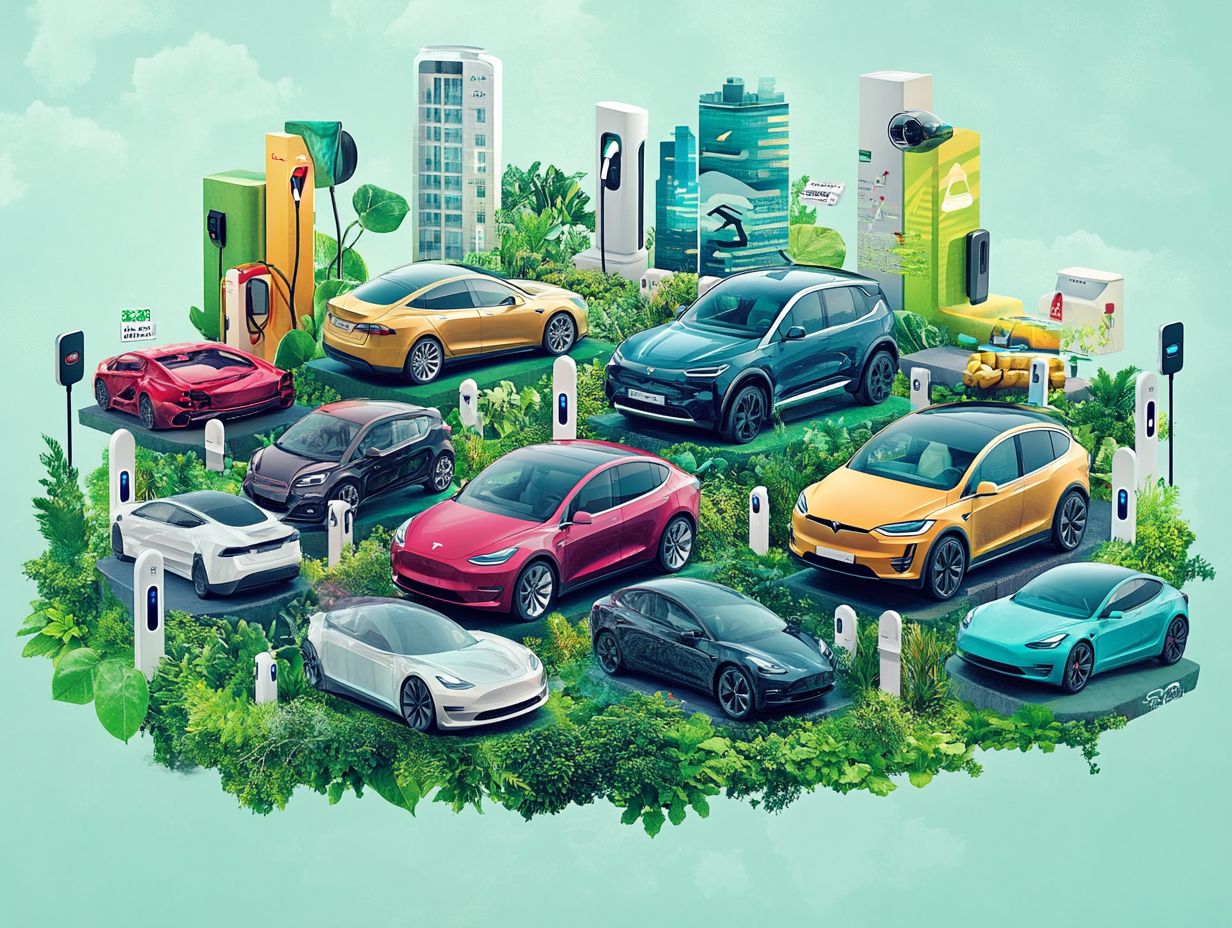
What are the top electric vehicle brands?
The top electric vehicle brands include Tesla, Nissan, Chevrolet, Audi, BMW, and Kia.
Which electric vehicle brand has the most models available?
Tesla offers the most electric vehicle models, including the popular Model 3, Model S, and Model X.
What type of electric vehicles do these top brands offer?
These brands provide a variety of models, including sedans, SUVs, and even sports cars.
Are these top electric vehicle brands affordable?
While Tesla may be on the pricier side, brands like Nissan, Chevrolet, and Kia offer more budget-friendly options.
Do these brands have a good driving range?
Yes, many of these top electric vehicle brands boast impressive driving ranges, with some models offering up to 400 miles on a single charge.
What makes these top electric vehicle brands stand out?
These brands are known for their innovative technology, sleek designs, and commitment to sustainability and reducing carbon emissions.

